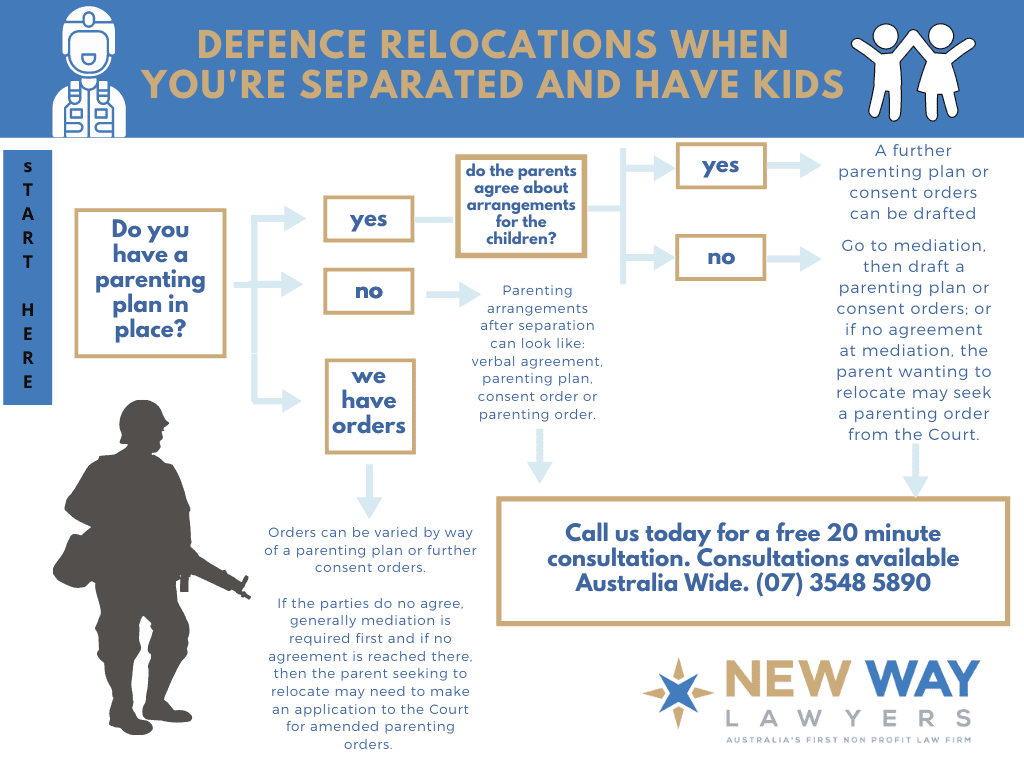
Posting relocations are difficult for Australian Defence families at the best of times, but even more so when the move occurs following separation and there are parenting arrangements to consider. Emotions are often intensified and feelings of uncertainty can arise for children and parents alike. Our experienced family lawyers have helped many Defence families with questions about family law and posting relocations. Set out below is some general information that may be helpful to families who find themselves in this situation.
For those newly separated in the Australian Army, Navy or Air Force
there are four approaches parents can take to parenting arrangements after separation. These are a verbal agreement, parenting plan, consent order or parenting order. To determine which might be best for you, take this simple quiz.
Is there separate rules for those in defence?
There are no separate rules for parenting arrangements when it comes to Australian defence relocation or deployment matters. The relevant objects and principles set out in the Family Law Act 1975 (Cth) guide the court, with the child’s best interests as the primary consideration.
What sort of orders can the court make?
The court has the ability to make broad orders including permitting a child to locate ‘wherever’ the parent in question was posted by the ADF, so long as this was in Australia. Two relevant recent cases on this matter are Wendland & Wendland [2017] FamCAFC 244 and Osmond & Brand [2019] FCCA 1696.

For those with a parenting plan in place
If you and your ex spouse or partner already have a parenting plan in place and there is no urgency involved, then the process can involve:
-
If the parties agree to the move
When both parents agree to the child/ren relocating with the defence member, a further parenting plan or consent orders can be drafted. The things that should be considered in a parenting arrangement can be found here.

-
If the other parent doesn’t agree to the move
When there is disagreement between the parents regarding the relocation of the child/ren, then generally mediation is compulsory (there are however some limited exceptions to the requirement for mediation). If an agreement is reached at mediation, then a parenting plan or consent orders can be drafted thereafter. If an agreement is not reached, the parent wanting to relocate may at that point need to seek a parenting order from the Court.
For those with court orders
When there are existing court orders, the parties will need to vary the orders to accommodate the new situation. This can be done by way of a parenting plan or further consent orders if the parties are in full agreement about the new arrangements. .
If the parties have existing orders but they do not agree on the move, then they will generally have to attend mediation first before going to court to seek variation of the orders. If there is no agreement reached at mediation, the parent seeking to relocate may need to make an application to the Court for amended parenting orders. The application would however have to satisfy the Rice v Asplund test. This threshold test is explained here.
Considerations that are relevant to parenting arrangements in Defence relocation / posting matters
It is well established that the best interests of the child include the minimisation of future proceedings and litigation. In light of this, the Court will try to ensure any further orders address the issue of future deployments, even if the details of future postings are unknown at the time the orders are being made.
In light of this, the court may consider whether one parent should have sole parental responsibility rather than an equal shared parental responsibility. The court might also consider whether orders should be made with two alternatives included, one allowing for arrangements that apply when the parents live in close proximity and the other for when the parents are living a long distance apart due to deployment or relocation.
Get expert family law advice early

Defence relocations are complex in nature and the considerations involved in these cases are varied and specific to each family. We highly recommend getting legal advice from expert family lawyers if you or your ex partner/spouse are relocating due to a posting order with the Australian Army, Air Force or Navy.
If you would like to discuss your options or the particulars of your case, phone New Way Lawyers on 1300 043 984 or contact us here for a free 20 minute consultation with one of our expert family lawyers. Australia wide consultations are available.



